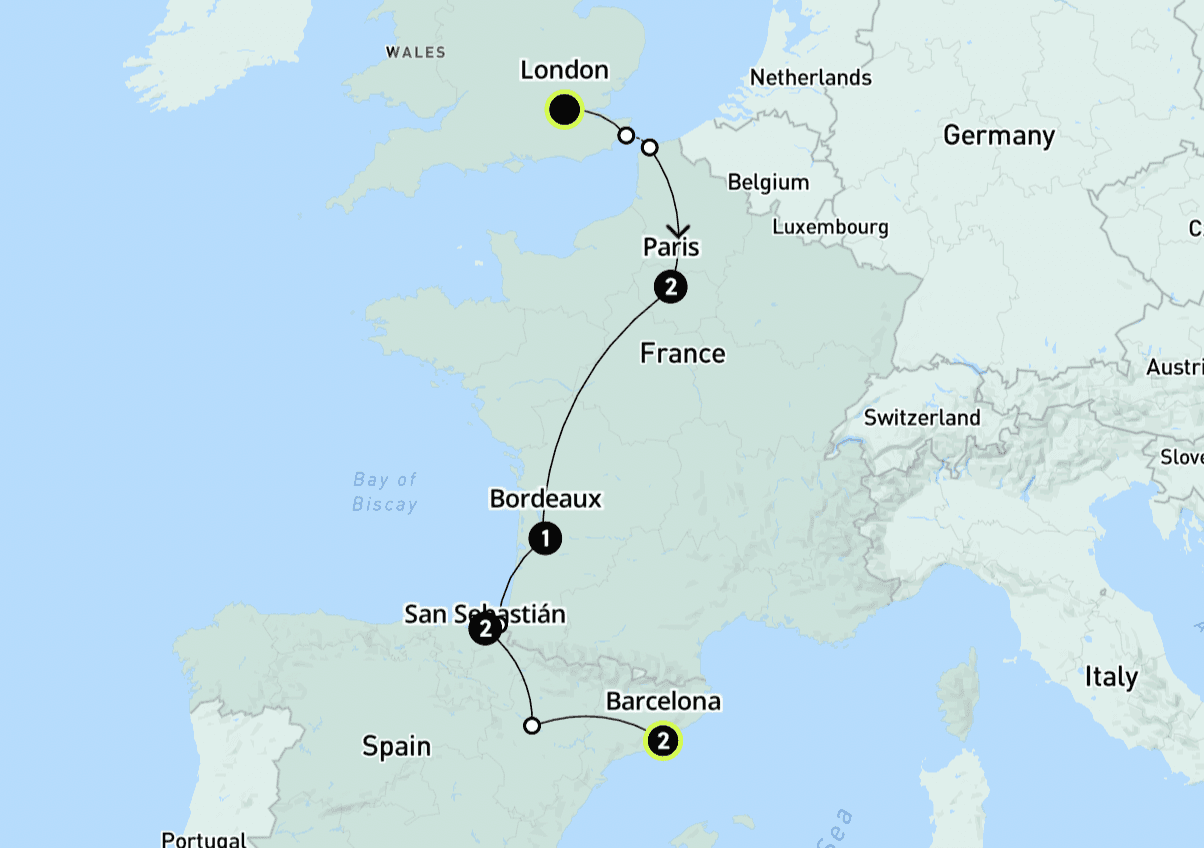Dreaming of a life under the Spanish sun? I’ll walk you through who qualifies to move to Spain and how to get started. From visas to residency, this guide breaks down the essentials for a smooth transition to your new home.

Have you ever daydreamed about sipping sangria on a sun-drenched terrace, strolling through cobblestone streets, or dipping your toes in the crystal-clear Mediterranean? I know I have! Spain has a way of capturing your heart with its vibrant culture, incredible food, enviable climate, and that famous laid-back lifestyle.
But moving to Spain isn't just a fantasy – it's totally doable for many people! I've helped countless friends navigate the process, and I'm excited to share everything I've learned. Whether you're planning to work, study, retire, or just experience life in a new country, Spain offers various pathways for different situations.
In this guide, I'll walk you through who qualifies to move to Spain and the nitty-gritty details of how to make it happen. Ready to turn that Spanish dream into reality? ¡Vamos! (Let's go!)
Who Can Move to Spain?
The good news is that Spain welcomes people from all walks of life! But your nationality, financial situation, and reasons for moving will determine your path. Let's break down who can make the move and what you'll need.
EU/EEA Citizens
If you're from an EU or EEA country (plus Switzerland), you hit the jackpot! You have the right to live and work in Spain without jumping through too many hoops.
I remember my friend Sophia from Germany just packed up her car and drove to Barcelona one summer. The process was pretty straightforward for her, though not entirely paperwork-free.
As an EU citizen, you'll need:
A valid passport or national ID card
To register for a NIE (Número de Identificación de Extranjero) at a police station with foreigners' department
To register on the municipal register (empadronamiento) at your local town hall
Proof of healthcare coverage (European Health Insurance Card or private insurance)
Proof of financial means (if you're not working)
After three months, you'll need to apply for residency, but it's generally a formality if you meet the basic requirements.
Non-EU Citizens
For those of us from outside the EU (like Americans, Canadians, Australians, etc.), things are a bit more involved. Don't worry though – Spain still offers plenty of visa options!
My cousin Jake moved from Chicago to Madrid last year. He spent about three months preparing all his documents, but says the Spanish lifestyle has been worth every minute of paperwork.
As a non-EU citizen, you'll need to apply for a specific visa based on your situation:
Work visa (if you have a job offer)
Student visa (if you're studying)
Retirement/non-lucrative visa (if you have sufficient funds)
Digital nomad visa (for remote workers)
Investor visa (if you're making a significant investment)
Family reunification visa (if you have family in Spain)
Each visa has specific requirements for income, health insurance, background checks, and more. We'll dive deeper into these options later!
UK Citizens Post-Brexit
Ah, Brexit... it complicated things for my British friends. UK citizens used to enjoy EU freedom of movement, but now they follow similar rules to other non-EU countries.
If you're British, you'll need to:
Apply for a visa that matches your situation (work, study, retirement, etc.)
Meet the financial requirements for your chosen visa
Obtain private health insurance
Go through the residence permit process
UK citizens who were legally residing in Spain before December 31, 2020, had their rights protected under the Withdrawal Agreement. They needed to exchange their green EU registration certificates for a new TIE (Tarjeta de Identidad de Extranjero) card.
My friend Oliver moved from London to Valencia just before Brexit. He said the bureaucracy was frustrating at times, but the Spanish officials were generally helpful and understanding.
How to Start the Process of Moving to Spain
Alright, so you've decided Spain is for you – awesome choice! Now let's get into how to make this happen, step by step.
Step 1: Determine Your Visa Type
First things first – figure out which visa suits your situation best. This decision will shape your entire application process.
When I was researching for my own potential move, I created a spreadsheet comparing all the options. Here's a simplified breakdown:
Work visa: For those with a job offer from a Spanish company
Student visa: For those enrolled in Spanish educational programs
Retirement/non-lucrative visa: For retirees or those with passive income
Digital nomad visa: For remote workers employed outside Spain
Golden visa: For those making significant investments (usually in real estate)
Family reunification visa: For joining family members already in Spain
Research each option carefully and choose the one that aligns with your circumstances. The Spanish government website (www.exteriores.gob.es) has detailed information, though I found calling the nearest Spanish consulate directly often provides the clearest guidance.
Step 2: Gather Required Documents
This step can be time-consuming, so start early! Each visa has specific requirements, but most commonly you'll need:
Valid passport (with at least one year of validity remaining)
Completed visa application form
Recent passport-size photos
Proof of health insurance with coverage in Spain
Medical certificate (for some visa types)
Criminal background check from your home country
Proof of financial means (bank statements, income proof, etc.)
Specific documents related to your visa type (job contract, enrollment letter, property deed, etc.)
All documents must be translated into Spanish by an official translator and, in many cases, apostilled (officially certified). This can take time and money – I spent about $300 getting my documents properly translated and certified.
Pro tip: Make multiple copies of everything! Spanish bureaucracy loves paperwork, and you'll need copies for various offices.
Step 3: Apply for a Visa
With your documents prepared, it's time to submit your application:
Book an appointment at your nearest Spanish consulate or embassy
Submit your application and documents in person (some consulates require this)
Pay the application fee (varies by visa type, usually €80-€150)
Provide biometric information if required
Wait for processing (typically 1-3 months)
My friend Maria applied for her student visa in Boston and said the consulate staff were surprisingly helpful. They even called her when they noticed a minor issue with one document, allowing her to fix it without delaying the application.
Be patient during this waiting period – Spanish bureaucracy moves at its own pace! But once approved, you'll receive your visa and can start planning your move.
Step 4: Move to Spain and Complete Residency Requirements
Congratulations! With visa in hand, you can finally make the move. But the paperwork journey isn't quite over yet.
After arriving in Spain, you'll need to:
Get your NIE (Número de Identificación de Extranjero): This identification number is essential for everything from opening a bank account to signing a lease. EU citizens typically get this at a police station, while non-EU citizens usually receive it with their visa.
Apply for a TIE (Tarjeta de Identidad de Extranjero): Non-EU citizens must apply for this physical residence card within 30 days of arrival. You'll need to make an appointment at the nearest Foreigners' Office (Oficina de Extranjería) or police station.
Register your address (empadronamiento): Visit your local town hall to register your address on the municipal census. This step is crucial for accessing healthcare, schools, and other services.
I still remember the look on my American friend Tom's face when he realized he needed to visit four different government offices in his first two weeks in Madrid. "It's like a bureaucratic scavenger hunt," he joked. But he also said the sense of accomplishment when it was all done was amazing.
Popular Visa Options for Moving to Spain
The Spanish work visa is for non-EU citizens who have secured a job with a Spanish company. The catch? Your employer generally needs to prove they couldn't find an EU citizen to fill the role.
Requirements typically include:
Job contract from a Spanish employer
Proof the employer has applied for work authorization on your behalf
Proof of qualifications for the position
Clean criminal record
Medical certificate
Proof of finances for your initial stay
The most in-demand jobs in Spain include IT professionals, healthcare workers, engineers, and tourism specialists. Jobs requiring English are often found in major cities like Madrid, Barcelona, and Valencia.
My colleague Sarah landed a teaching position at an international school in Barcelona. Her school helped with the visa process since they specifically needed native English speakers. If you're a teacher, this can be a great route!
Student Visa
Studying in Spain is a fantastic way to experience the culture while furthering your education. The student visa allows you to stay for the duration of your course.
To qualify, you'll need:
Acceptance letter from a recognized Spanish educational institution
Proof of sufficient funds (approximately €900 per month)
Health insurance
Clean criminal record
Medical certificate
Spain has some excellent universities, with the University of Barcelona, Complutense University of Madrid, and University of Valencia being particularly popular among international students.
An added bonus? Student visas usually allow you to work up to 20 hours per week, giving you some income while studying. After graduating, you may be eligible for a job search visa or work visa.
Retirement Visa
Also known as the non-lucrative visa, this option is perfect for retirees or anyone with sufficient passive income to support themselves without working in Spain.
Requirements include:
Proof of regular income (approximately €2,400 per month or €30,000 annually)
Comprehensive private health insurance
Clean criminal record
Medical certificate
Spain is a retirement paradise with its affordable cost of living, excellent healthcare system, and relaxed lifestyle. Popular retirement spots include the Costa del Sol, Costa Blanca, and the Balearic Islands.
My parents' friends, the Johnsons, retired to a small town near Alicante two years ago. They say their pension goes twice as far in Spain, and the warm climate has done wonders for Mr. Johnson's arthritis!
Digital Nomad Visa
Spain's newest visa option is perfect for remote workers and digital entrepreneurs. Officially called the "Visa for International Remote Workers," it allows you to live in Spain while working for companies outside the country.
To qualify, you'll need:
Proof of remote work arrangement (employment contract or business registration)
Minimum income requirements (typically around €2,000-€3,000 monthly)
Health insurance
Clean criminal record
Less than 20% of your income from Spanish sources
This visa is valid for one year and can be renewed if you continue to meet the requirements. It's ideal for freelancers, consultants, and employees with flexible work arrangements.
My digital marketer friend Lucy moved to Valencia on this visa last year. She works for a Canadian company during US business hours, which gives her mornings free to enjoy Spanish life. "Working from a café near the beach beats my old cubicle any day," she says.
Settling in Spain: What to Do After Arrival
Once the visa process is complete and you've arrived in sunny Spain, there are several practical matters to address to help you settle in comfortably.
Finding Accommodation
Finding the right place to live is crucial to your Spanish experience. You have several options:
Short-term rentals: Start with Airbnb or a serviced apartment while you get to know different areas.
Long-term rentals: Websites like Idealista, Fotocasa, and Spotahome are popular for finding apartments.
Buying property: If you're looking to purchase, work with a reputable real estate agent who understands the local market.
Popular expat areas include:
Madrid: Salamanca, Chamberí, and Retiro for upscale living; Malasaña and La Latina for a more bohemian vibe
Barcelona: Eixample, Gràcia, and Poblenou
Valencia: Ruzafa, El Carmen, and Benimaclet
Southern coast: Marbella, Malaga, and Alicante
When I helped my friend look for an apartment in Madrid, we noticed that having a NIE number and Spanish bank account made landlords much more willing to rent to her. Consider temporary accommodation at first while you sort out these essentials.
Registering for Healthcare
Spain's healthcare system is ranked among the best in the world, and accessing it should be a priority.
EU citizens: Use your European Health Insurance Card initially, then register with the Spanish healthcare system with your residency documents.
Non-EU citizens: You'll need private health insurance that meets visa requirements. Once you're working and paying into the Spanish social security system, you can access public healthcare.
To register for public healthcare:
Get your social security number at the local Tesorería General de la Seguridad Social office
Take this number, your NIE, and padrón to your local health center to register
You'll receive a health card (tarjeta sanitaria) for accessing services
My British friend James was amazed at how comprehensive the coverage was and how little he paid for prescriptions compared to the UK.
For private insurance, companies like Sanitas, ASISA, and DKV offer plans specifically designed for expats. Expect to pay around €60-€200 monthly depending on your age and coverage level.
Opening a Bank Account
Having a Spanish bank account is essential for paying bills, receiving salary, and managing day-to-day finances.
To open an account, you'll generally need:
Your passport
NIE number
Proof of address (rental contract or utility bill)
Employment contract or proof of income
Banks popular with expats include:
Sabadell: Offers services in English and has an "Expat Account"
BBVA: User-friendly app with English option
Santander: Extensive network of branches and ATMs
N26 and Revolut: Digital options with easy setup
I recommend visiting several banks in person to compare services and fees. Many offer special packages for newcomers to Spain.
Learning Spanish
While you can get by with English in tourist areas and larger cities, learning Spanish will dramatically improve your experience and integration.
Options for learning include:
Official language schools (Escuelas Oficiales de Idiomas) offer affordable courses
Private language academies like Cervantes Institute
Language exchange meetups (intercambios)
Apps like Duolingo, Babbel, and Memrise for daily practice
My friend Lisa committed to one hour of Spanish practice daily and attended weekly intercambios at a local café. After six months, she was confidently handling everyday situations and making local friends.
Don't underestimate how much locals appreciate even basic efforts to speak their language. Those few Spanish phrases can transform your interactions from transactional to personal!
Moving to Spain is a journey filled with paperwork, patience, and ultimately, incredible rewards. Whether you're drawn by the Mediterranean lifestyle, vibrant culture, or career opportunities, Spain offers pathways for many different life situations.
The key steps to remember are:
Determine which visa matches your situation
Gather and prepare all necessary documents
Apply through the proper channels
Complete residency requirements after arrival
Set up the practicalities of life in Spain
Yes, the bureaucracy can be challenging, and yes, there will be moments of frustration. But ask any expat in Spain if it was worth it, and you'll almost certainly get a resounding "¡Sí!"
I've seen friends transform their lives after moving to Spain – finding new passions, improving their work-life balance, and embracing a lifestyle that prioritizes connection and enjoyment.
Ready to take the next step? I suggest starting with the Spanish consulate website in your country or scheduling a consultation with an immigration lawyer who specializes in Spanish visas. And don't hesitate to join online expat forums where you can learn from others who have already made the move.
¡Buena suerte (good luck) on your Spanish adventure!
Have you started planning your move to Spain? Are you leaning toward a particular visa option? Share your thoughts or questions in the comments below – I'd love to hear about your plans and help if I can!
FAQS Travel to Paradiso
Recent Posts

























